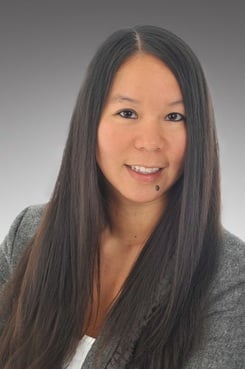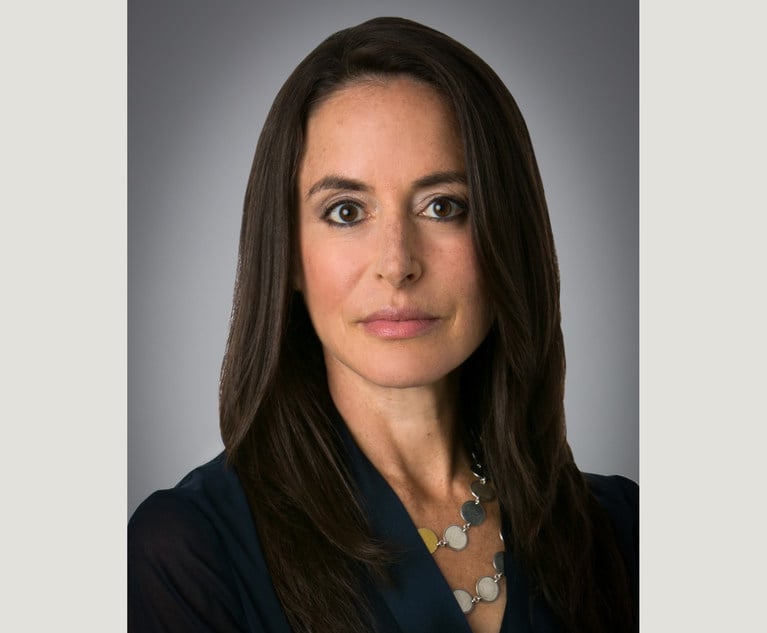Women Exit Ogletree Deakins in Wake of Gender Bias Allegations
“A lot of my good friends had left. I looked around and said, 'Why am I still here?'” said a former nonequity partner at Ogletree Deakins, a national labor and employment firm facing a $300 million gender bias suit.
July 31, 2018 at 05:39 PM
8 minute read

Ogletree, Deakins, Nash, Smoak & Stewart, a national labor and employment firm facing a $300 million gender bias suit, has watched several women partners head for the doors this year. The firm, however, is taking steps to address diversity and inclusion issues.
Gillian Yee, a former nonequity partner at Ogletree Deakins, recently jumped to national labor and employment rival Jackson Lewis in Detroit. With her departure, Yee joined a growing queue of women lawyers who have left Ogletree Deakins since January, when fellow former nonequity partner Dawn Knepper hit the firm with a proposed collective action alleging gender bias.
The suit, which came a little more than a month before Knepper joined Buchalter in Irvine, California, initially saw Knepper as the sole plaintiff. But in May, three other former Ogletree Deakins nonequity partners—Jocelyn Campanaro and Angelica Ochoa from Fisher & Phillips in Denver, as well as Lillard Wise Szygenda's Alicia Voltmer in Dallas—joined the case as named plaintiffs. In late June, Tracy Warren, a former Ogletree Deakins equity partner who like Knepper joined Buchalter in Southern California earlier this year, also sought to join the suit.
According to ALM Legal Intelligence, 10 women who held a partner-level role at Ogletree Deakins—the firm uses the title “shareholder” to identify partners—have left the 759-lawyer firm since January. That's a little more than half of the 19 partners in total that have left so far this year, according to ALI. (During that time, Ogletree Deakins also added female partners Lisa Hamasaki in San Francisco and Cécile Martin in Paris.)
In February, Pryor Cashman and Polsinelli picked up immigration experts Maria Gandarez and Sarah Hawk in New York and Atlanta, respectively, while labor and employment litigator Cheryl Schreck joined Fisher & Phillips in Los Angeles. Barnes & Thornburg added Ogletree Deakins partners Dawn Collins and Tae Kim for its Los Angeles office in March. Other Ogletree Deakins partners on the move this year include Dinah Choi, now corporate counsel for global health and safety at Amazon Web Services LLC in Portland, Oregon, and Sarah Nichols, who has set up her own shop in San Francisco.
Yee, who before joining Jackson Lewis last week had worked at Ogletree Deakins for the past decade, declined to discuss the gender bias litigation targeting her former firm.
 Gillian Yee
Gillian Yee“Let's talk about Jackson Lewis. It's innovative, progressive and has all sorts of different ways for attorneys to thrive in their practice,” she said. ”There is a commitment to diversity here that I share.”
David Sanford of Sanford Heisler Sharp, a veteran litigator in taking on Big Law, represents plaintiffs in the gender bias litigation against Ogletree Deakins. He said his firm has often been retained for gender bias suits against large law firms, including some that have settled. (Chadbourne & Parke, now part of Norton Rose Fulbright, settled earlier this year a gender bias case filed by three former partners represented by Sanford.)
The women who have left Ogletree Deakins' partnership this year either did not return requests for comment or declined to be identified by name for this story when discussing their former firm.
“A lot of my good friends had left. I looked around and said, 'Why am I still here?'” one woman, a former nonequity partner at Ogletree Deakins, told The American Lawyer.
In their amended complaint filed in May, the plaintiffs suing Ogletree Deakins claim that women lawyers at the firm “face discrimination in pay, promotions and other unequal opportunities in the terms and conditions of their employment.”
The suit against Ogletree Deakins, one of several cases now shining a spotlight on Big Law compensation practices, also accuses it of being a place where male partners are “disproportionately over-represented at every level of the firm's management and leadership structure.” Those allegedly dominant male decision-makers, according to the complaint, deny female partners the same business development and training opportunities afforded to their male colleagues.
”Through formal policies and widespread practices, the firm's male leadership interferes with, limits, or prevents female shareholders from receiving the appropriate credit for the business they bring to the firm and their hard work in running complex and demanding cases day-to-day. All the while, their male colleagues reap the professional and financial profits that women generate,” states the suit filed in federal court in San Francisco. ”Female shareholders are not selected for business pitches at the same rate as similarly situated, and in some cases less qualified, male attorneys. Through these practices, the firm systematically overlooks, devalues, or undermines female attorneys as business generators, which adversely effects their pay and promotion.”
Ogletree Deakins, which is being represented by Paul Hastings in the litigation, has not yet responded in a court filing to the plaintiffs, although the firm's management has previously rejected their allegations. In a statement issued after a first amended complaint was filed, Ogletree Deakins said it would “confidently defend” itself in court and noted that it maintains a steadfast commitment to equal opportunity.
“We do not tolerate discrimination of any kind—gender or otherwise. We take the allegations filed by former shareholders very seriously,” the firm said in May. “However, the decision-making process that governs our compensation system is both fair and equitable.”
In another statement provided Tuesday evening to The American Lawyer, Ogletree Deakins said that equal opportunity has been a core principle of the firm since its founding in 1977.
“We do not tolerate discrimination of any kind—gender or otherwise,” the firm said. “The decision-making process that governs our compensation system is fair, equitable and fully transparent. Under our 'open compensation' system, all shareholders in the firm know what every other shareholder earns—and the factors that support those determinations. In fact, allegations of pay discrimination are disproven by a recent compensation analysis conducted by a prominent labor economist, who found that for both equity and nonequity shareholders nationwide, gender had no impact on compensation.”
Ogletree Deakins also noted that it has three women on its nine-member board, as well as two women on its four-partner compensation committee. The firm said that women comprise more than half of the people in its ranks, and that during the past four years, the majority of lawyers promoted to partner have been women. Ogletree Deakins said that of the 11 individuals it elevated to partner in January, eight were women. Half of those elected to equity partner, the firm said, were also women.
As part of its efforts to promote equity, Ogletree Deakins recently formed a task force to study issues related to the advancement and recognition of women at the firm. Based on that task force's recommendations, Ogletree Deakins' board has adopted a number of initiatives to tweak its credit guidelines, pay equity and extended leave and flexible work policies. Those measures have included Ogletree Deakins appointing two individuals—a senior female partner and a former member of the board—to assist the firm in resolving workplace issues and create a positive work environment for diversity and inclusion.
Ogletree Deakins also noted several recent accolades it has received, including a ranking of No. 12 on sibling publication The National Law Journal's 2018 Women's Scorecard, as well as a top two ranking in the 600-lawyer category for Law360's 2018 Glass Ceiling Report. Just this month, Ogletree Deakins said it was recognized as a “Gold Standard” firm for leadership roles achieved by equity women partners by the Women in Law Empowerment Forum, the third time the firm has received the honor.
The American Lawyer, in its recently published A-List rankings, identified Ogletree Deakins as the 71st large firm in the nation based on its percentage of female equity partners. At the firm, which earlier this month hired a new head of its electronic discovery and records release practice and launched an M&A practice, 18.9 percent of 181 equity participants are female.
UPDATE: 7/31/18, 10:38 p.m. EDT. A statement and other information from Ogletree Deakins has been added to the final six paragraphs of this report.
This content has been archived. It is available through our partners, LexisNexis® and Bloomberg Law.
To view this content, please continue to their sites.
Not a Lexis Subscriber?
Subscribe Now
Not a Bloomberg Law Subscriber?
Subscribe Now
NOT FOR REPRINT
© 2025 ALM Global, LLC, All Rights Reserved. Request academic re-use from www.copyright.com. All other uses, submit a request to [email protected]. For more information visit Asset & Logo Licensing.
You Might Like
View All
Morgan Lewis Closes Shenzhen Office After Less Than Two Years


Trending Stories
- 1'A Death Sentence for TikTok'?: Litigators and Experts Weigh Impact of Potential Ban on Creators and Data Privacy
- 2Bribery Case Against Former Lt. Gov. Brian Benjamin Is Dropped
- 3‘Extremely Disturbing’: AI Firms Face Class Action by ‘Taskers’ Exposed to Traumatic Content
- 4State Appeals Court Revives BraunHagey Lawsuit Alleging $4.2M Unlawful Wire to China
- 5Invoking Trump, AG Bonta Reminds Lawyers of Duties to Noncitizens in Plea Dealing
Who Got The Work
J. Brugh Lower of Gibbons has entered an appearance for industrial equipment supplier Devco Corporation in a pending trademark infringement lawsuit. The suit, accusing the defendant of selling knock-off Graco products, was filed Dec. 18 in New Jersey District Court by Rivkin Radler on behalf of Graco Inc. and Graco Minnesota. The case, assigned to U.S. District Judge Zahid N. Quraishi, is 3:24-cv-11294, Graco Inc. et al v. Devco Corporation.
Who Got The Work
Rebecca Maller-Stein and Kent A. Yalowitz of Arnold & Porter Kaye Scholer have entered their appearances for Hanaco Venture Capital and its executives, Lior Prosor and David Frankel, in a pending securities lawsuit. The action, filed on Dec. 24 in New York Southern District Court by Zell, Aron & Co. on behalf of Goldeneye Advisors, accuses the defendants of negligently and fraudulently managing the plaintiff's $1 million investment. The case, assigned to U.S. District Judge Vernon S. Broderick, is 1:24-cv-09918, Goldeneye Advisors, LLC v. Hanaco Venture Capital, Ltd. et al.
Who Got The Work
Attorneys from A&O Shearman has stepped in as defense counsel for Toronto-Dominion Bank and other defendants in a pending securities class action. The suit, filed Dec. 11 in New York Southern District Court by Bleichmar Fonti & Auld, accuses the defendants of concealing the bank's 'pervasive' deficiencies in regards to its compliance with the Bank Secrecy Act and the quality of its anti-money laundering controls. The case, assigned to U.S. District Judge Arun Subramanian, is 1:24-cv-09445, Gonzalez v. The Toronto-Dominion Bank et al.
Who Got The Work
Crown Castle International, a Pennsylvania company providing shared communications infrastructure, has turned to Luke D. Wolf of Gordon Rees Scully Mansukhani to fend off a pending breach-of-contract lawsuit. The court action, filed Nov. 25 in Michigan Eastern District Court by Hooper Hathaway PC on behalf of The Town Residences LLC, accuses Crown Castle of failing to transfer approximately $30,000 in utility payments from T-Mobile in breach of a roof-top lease and assignment agreement. The case, assigned to U.S. District Judge Susan K. Declercq, is 2:24-cv-13131, The Town Residences LLC v. T-Mobile US, Inc. et al.
Who Got The Work
Wilfred P. Coronato and Daniel M. Schwartz of McCarter & English have stepped in as defense counsel to Electrolux Home Products Inc. in a pending product liability lawsuit. The court action, filed Nov. 26 in New York Eastern District Court by Poulos Lopiccolo PC and Nagel Rice LLP on behalf of David Stern, alleges that the defendant's refrigerators’ drawers and shelving repeatedly break and fall apart within months after purchase. The case, assigned to U.S. District Judge Joan M. Azrack, is 2:24-cv-08204, Stern v. Electrolux Home Products, Inc.
Featured Firms
Law Offices of Gary Martin Hays & Associates, P.C.
(470) 294-1674
Law Offices of Mark E. Salomone
(857) 444-6468
Smith & Hassler
(713) 739-1250










